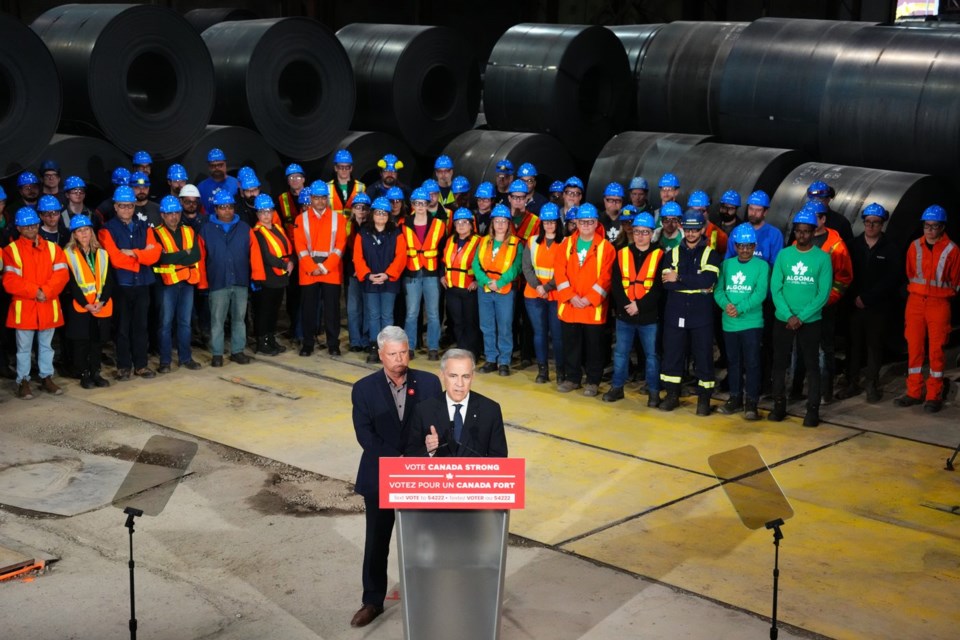OTTAWA — Federal party leaders hit the hustings Friday with election day fast approaching, as Mark Carney of the Liberals focused on U.S. tariff threats in a steel town and Conservative Leader Pierre Poilievre campaigned on his anti-crime platform in Saskatoon.
Canadians cast ballots to choose their next government on Monday.
The Liberals are widely seen to be leading in the polls, with the Conservatives in second place and the Bloc Québécois, NDP and Greens trailing behind.
The campaign stops in the final phase of the election are showing each leader's hand, said David McGrane, a political scientist at the University of Saskatchewan.
The Conservatives are trying to hold onto their seats through visits from Poilievre, McCrane said, while the Liberals are confident enough they'll form government that Carney is spending time in contested ridings.
"Historically this is sort of the equivalent of a poker player having a tell," he said. "They're telling their opponents essentially what they have in their hands."
Carney visited the Algoma Steel factory in Sault Ste. Marie, Ont., to highlight his party's promise to forge a procurement strategy that relies on homegrown materials.
The Liberals also pledge to build an all-in-Canada auto manufacturing network using domestic steel, aluminum and critical minerals.
NDP Leader Jagmeet Singh campaigned in Ontario in Liberal-leaning ridings in Toronto, Hamilton and London. He said at a morning campaign stop he feared the Liberals would win re-election and implement large budget reductions reminiscent of the party's cuts in the 1990s.
Poilievre began his day with a press conference in Saskatoon, where he pledged to pass an affordability law and a "massive omnibus crime bill" within the first 100 days if he becomes prime minister.
He also said he would call U.S. President Donald Trump on Day 1 to tell him tariffs are destructive, and seek to begin renegotiating North America's free trade deal right away.
Poilievre stopped in Calgary en route to Nanoose Bay, B.C., and metro Vancouver before he ends the campaign in his Ottawa riding Sunday.
Recent polls suggest that ridings in both Saskatoon and the Nanaimo area, which includes Nanoose Bay, are leaning Conservative.
Carney planned to participate in a virtual Assembly of First Nations forum before additional Ontario events in Georgetown, Cambridge and London.
Polls suggest that the Liberals are leading in Ontario, though two ridings in the London area and the riding of Sault Ste. Marie—Algoma are leaning Conservative.
McGrane said it was not encouraging for the Conservatives that Poilievre visited Saskatchewan at the tail end of the election campaign, after the Tories took all 14 ridings in the province in 2021.
"It does appear to be a bit of a sign of weakness on his part, making the Saskatchewan stop so late in the campaign, when every minute of the time (left) really matters," he said.
Elections Canada data on advance-poll voting that took place April 18 to 21 shows that districts where party leaders are candidates had some of the highest turnout.
The riding with the most votes in advance polling was Carleton in the Ottawa area, where Poilievre is defending his seat, while the neighbouring Nepean riding where Carney is on the ballot ranked fifth.
Second in voter turnout was Saanich—Gulf Islands, held by Green co-leader Elizabeth May, while Singh's Burnaby Central riding was in the middle of the pack of 343 ridings.
As parties prepare for final voting Monday, McCrane said he is not surprised to see leaders reiterating messages they have been communicating for weeks, instead of outlining new pledges.
"It's tough to sort of make huge changes at the end of the campaign," he said. Instead, parties try appealing to the 15 to 25 per cent of the population that tends to wait to decide how to vote.
"You've got to hope that in this last little bit here, that those late-deciders are starting to come your way, and usually how you do that is by reinforcement," McGrane said.
That entails the Liberals talking about experienced leadership, the Tories focusing on affordability, the NDP seeking influence on issues like health care and the Bloc Québécois saying it can push for Quebec's interests.
Bloc Leader Yves-François Blanchet put that perspective in frank terms Friday, calling Canada "an artificial country with very little meaning" at a campaign stop in Shawinigan, Que. "It's a foreign Parliament, because this nation is not mine."
— With files from Anja Karadeglija in Sault Ste. Marie, Ont., Jack Farrell in Saskatoon, David Baxter in Toronto and Jim Bronskill in Ottawa
This report by The Canadian Press was first published April 25, 2025.
Dylan Robertson, The Canadian Press



